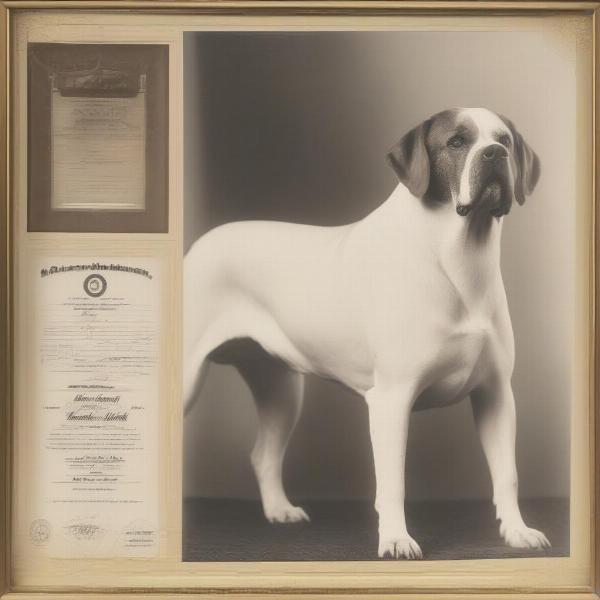Understanding stud fees is crucial for responsible dog breeding. Whether you’re a seasoned breeder or considering your dog’s first litter, navigating the world of stud fees can be complex. This guide will provide you with practical advice and insights into the factors influencing stud fees, negotiation strategies, and ensuring a successful breeding process.
Factors Influencing Stud Fees
Several factors contribute to the variation in stud fees. Understanding these factors helps you determine a fair price and make informed decisions.
- Breed: Popular or rare breeds often command higher stud fees. The demand for specific breeds directly impacts the price. For example, a French Bulldog stud fee might be significantly higher than that of a less popular breed.
- Pedigree and Lineage: A dog with champion bloodlines or a proven track record of producing desirable offspring will typically have a higher stud fee. Detailed pedigree records and titles earned by the stud dog play a significant role.
- Health and Conformation: A healthy stud dog with excellent conformation, adhering to breed standards, is more valuable. Health testing and certifications demonstrating the dog’s health status contribute to a higher stud fee.
- Location: Stud fees can vary geographically due to local demand and breeding practices.
- Experience and Success Rate: A stud dog with a proven history of successful litters and easy breeding is more desirable, hence a higher fee.
 Stud Dog with Pedigree Certificate
Stud Dog with Pedigree Certificate
Negotiating Stud Fees and Contracts
Negotiating stud fees is a common practice. Open communication between the stud dog owner and the dam owner is crucial.
- Research Comparable Fees: Researching the average stud fee for the breed in your area provides a good starting point for negotiations.
- Discuss Inclusions: Clarify what the stud fee covers, such as the number of breedings, artificial insemination, and any guarantees. This ensures both parties are on the same page.
- Written Contract: Always have a written contract outlining all agreed-upon terms, including the stud fee, payment schedule, and health guarantees. This protects both parties involved in the breeding process.
Ensuring a Successful Breeding
A successful breeding process requires careful planning and consideration.
- Health Testing: Before breeding, both the stud dog and the dam should undergo thorough health testing to ensure they are free from any genetic diseases or health conditions.
- Timing the Breeding: Accurate timing of the breeding cycle is essential for maximizing the chances of conception. Consult with a veterinarian or experienced breeder for guidance.
- Post-Breeding Care: After breeding, proper care for the dam is crucial for the health of the dam and the developing puppies.
Conclusion
Determining the right stud fee for dogs involves considering various factors, from breed and pedigree to health and location. Open communication, a well-defined contract, and a focus on the health and well-being of both dogs are essential for a successful breeding experience. Remember, responsible breeding practices prioritize the health and welfare of the animals involved.
FAQ
- What is a typical stud fee range? Stud fees can vary widely, from a few hundred dollars to several thousand, depending on the factors discussed above.
- Can I negotiate the stud fee? Yes, negotiating stud fees is a common practice. Open and honest communication between the parties involved is key.
- What should a stud dog contract include? A stud dog contract should outline the stud fee, payment schedule, health guarantees, and breeding arrangements.
- What health tests should be done before breeding? Essential health tests vary depending on the breed, but often include hip and elbow evaluations, eye exams, and genetic testing.
- What if the breeding is unsuccessful? The stud dog contract should address this scenario and outline any guarantees or re-breeding options.
- How is the stud fee paid? Payment arrangements are typically outlined in the contract and can vary, but often involve payment upfront or upon successful breeding.
- What are the responsibilities of the stud dog owner? The stud dog owner is responsible for providing a healthy, proven stud dog and cooperating with the breeding process.
Related Articles
About ILM Dog
ILM Dog is your trusted source for comprehensive dog care information, offering expert advice on breed selection, health, training, nutrition, grooming, and much more. We’re dedicated to helping dog owners worldwide provide the best possible care for their canine companions. Whether you’re a first-time dog owner or a seasoned breeder, ILM Dog provides valuable insights and resources to support you every step of the way. From finding the right best mushroom supplement for dogs to understanding the importance of adrenal support for dogs, we’ve got you covered. Contact us at [email protected] or +44 20-3965-8624 for personalized support.